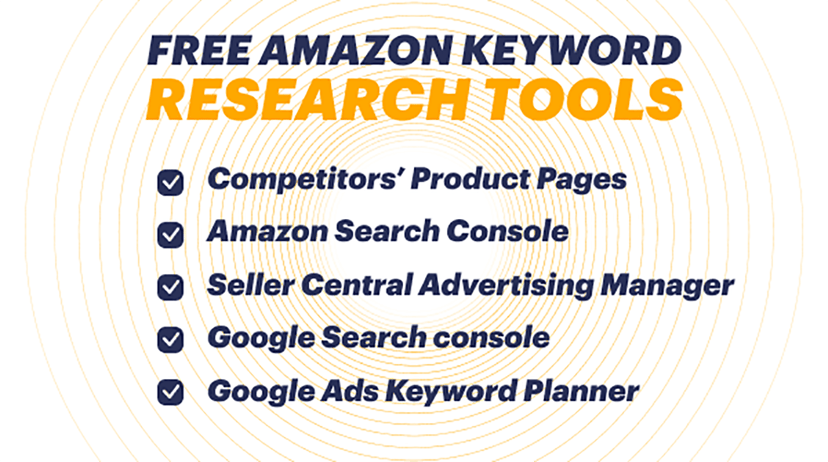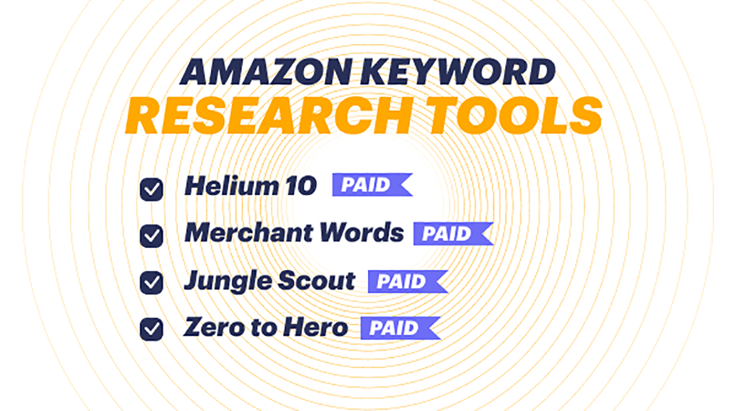Amazon has experienced monumental growth in 2020. Twice as many sales and more competitors than ever before. For sellers to thrive in the new normal, they need to identify the exact keywords that will drive the most sales. We discuss how to optimize your keywords by following your competitor’s best practices.
The last major Amazon Marketplace algorithm update took place in autumn 2019. So why is everyone talking about Amazon keyword research being different this year?
It all has to do with Amazon's marketplace growth throughout 2020. The projected US retail market share served by Amazon is set to double by the end of 2020 compared to 2019. Twice as much money will be spent across all Amazon product categories. And more than ever, competitors will want to be there to serve the Amazon shopper.
One thing that remains unchanged is the fact that 60% of all sales on Amazon will go to an Amazon seller who shows up on the first half of the Page 1 Amazon search results. And that prime real estate space remains the same size year after year.
So yes, in 2020 you need to be super-efficient with your Amazon marketplace customer acquisition strategies - if you want a share of this twice-as-big pie. You need to consider your product listing, product title, and relevant keywords for your Amazon PPC campaign.
And the best way to stay efficient is to use the right keywords and keyword data to get the attention of your customers, and maybe even Amazon autocomplete. As an Amazon seller, you need to let Amazon’s algorithm know when to display your product listing. And also, when NOT to display it.
Fake It... Till You Make It

All products are searched for by real people using a combination of relevant Amazon keyword or keyword phrase to describe them.
Keywords can be broad (like “dog food”) or include related keyword groups (like “laptop screen size 13”, i5, SSD 250” ...etc.) or long tail keywords (like "breathable running socks"). But they are all there before you start your research. Keeping to this keyword scout mindset always helps gauge your Amazon keyword research efficacy and can indicate when to stop the search.
But where do we begin searching for the perfect Amazon keyword? Well, I start by typing in a couple of very obvious search terms or keyword ideas that describe my product into the Amazon search engine to see what kind of search results come up. I also look at the Amazon search volume for each query. If over 80% of products are similar to mine - then that’s a good search term, worth turning into a seed keyword. But that is not the main reason to use the Amazon keyword search tool. It’s the competitors that I’m after at this stage.
Being at the top of the search volume via a highly relevant search term aka the main keyword means that these competitors are probably doing at least something right with their Amazon listing marketing efforts. This means that I would be wise to study at least the relevant keywords they believe to be the best for their products and I'm likely to discover hidden keywords I might have missed.
To do this - open an Amazon product listing and study its important keyword-holding fields:

- Product title
- Info on product pictures (if any)
- Bullet Points
- Product Description
Do this 5-10 times...
This will give you a keyword list in the descending order of relevance (and quite probably in search volume too). Write each keyword suggestion down and arrange them into some basic themes to be used later. There’s a high chance that you will identify your product’s primary keyword and secondary keyword that you can safely apply to both your own product listing and your Amazon PPC campaign (in exact match type right from the get-go).
Another sweet spot to look for highly relevant backend keywords is in the product reviews of your competitor’s Amazon listing. The customers are most likely to call out the product (and its key attributes) in the same way they’d go about searching for them. So browse the reviews and harvest the keyword search terms and keyword ideas that you haven’t already picked up on earlier.
Free Amazon Keyword Research Tool

There are a few places you could go to look for relevant keywords, apart from scrutinizing your competitors’ Amazon product listing or the search engine. In many cases, it could be helpful to use an Amazon keyword tool.
Amazon Search Console will not only provide you with search results, but also with alternative, most-searched variations of the search term you’re typing in. Mostly these will be the so-called “long tail keywords.” While not as useful in optimizing your product’s listing - they can score you a few extra sales if used with small bids in your Amazon PPC campaign (in exact match type).
Also, remember how I mentioned that 80% of search results needed to be similar to your product for the search term to be deemed relevant? Well, this works both ways: if you run an “Amazon console” otherwise known as an amazon keyword search tool, check to see if there are fewer relevant search results (i.e. there are many different products that are not like yours) - then this Amazon keyword is a candidate to be rejected. Keeping a tab of negative search terms, like names of features that your product does NOT have) - is a good way of keeping your PPC relevant and increasing your Ads’ spend power per sale.
You can also find a similar function in the Seller Central Advertising Manager. At the Sponsored Campaign set up level, Amazon will kindly provide you with the keyword ranking it considers relevant to your product (based on the keywords you’ve used in your product listing). This is a decent way of important keyword harvesting, and it also provides you with some idea about the bid ranges. But remember that this is just an algorithm, and it doesn't always make a right guess about all the keywords available or the keyword strategy you should employ. So stay reasonable and critical about these, and you should be ok.
Google Search console and especially Google Ads Keyword Planner are both totally free methods for finding a more specific keyword. I’ll not go into detail about using them here, but essentially the process is identical to using the Amazon keyword tool and PPC Setup. The key difference is that it works with a much broader database, and it uses more refined algorithms.
The bad news is that Google is NOT a marketplace. So you will have to cut out a lot of results to be left with those that are more or less relevant to selling the actual thing.
Paid Amazon Keyword Research Tool

Now, we all know that time IS money. There are a few well-known SaaS names that capitalize on this by providing some sort of keyword research tool. They all essentially do the same thing and run Amazon keyword research for you if you subscribe to their services. Helium 10, Merchant Words, and Jungle Scout are all happy to do the tedious work for you and give you a list of relevant keywords similar to your original input. Moreover, they will also give you the estimated number of impressions each of these keywords would get on Amazon, their approximate bid tag, and even how competitively other Amazon Sellers use particular keyword optimization in their PPC efforts. All you have to do, then, is assign these keywords into your product listing and your Amazon PPC campaign structure, assign bids, and launch.
There is also another way to speed things up even more. You could order a ready-to-go Sponsored Product, Brand, or Display ad for a particular ASIN from Profit Whales Zero to Hero Amazon PPC Creator Tool. This essentially does the same job as other keyword research services, but it goes a step further. Profit Whales keyword research tool verifies the discovered keywords with your competition, arranges them in order of relevancy, adds non-relevant keywords into negatives, harvests other keywords with targets (like weaker competing ASINs and relevant competitor brands), and assigns bid, and budgets to them in a uniquely-structured Amazon PPC Campaign. Your PPC Campaign set up takes about 10 minutes - and in a few hours, your fully operational campaign will be uploaded to your Seller Central and launched (if you select it to be). Now THAT is a timesaver for a busy Amazon seller!
Keywords Optimization for Existing Products and PPC
Keyword research and keyword strategy are crucial for the successful launch of a product on Amazon, and up until this point, I’ve assumed that we are in the launch phase. However, all the above techniques are perfectly applicable when looking for that extra seed keyword for your product listing and PPC campaigns. Plus you can dig into the Search Term Report that Seller Central provides to those who run PPC campaigns for extra keyword data and insights. Amazon shopper insights can also provide some helpful info.
This is a very important part of the Seller’s job: perfecting both the listing and the ads, whether it's Google Ads for Amazon or another channel. It means looking at the CTR, the ACoS, the returns, and the actual position of your product in an Amazon search results page. It means upping or lowering the bids to arrive at optimal ads spend-to-sales ratio. Pausing or even adding negative keywords and ASINs that are too costly to advertise on. Swapping keywords in your product listing and observing changes in conversions.
A Word on Passion about Amazon Keyword Search
The Best Seller and Amazon’s Choice badge holders I’ve worked with over the years have all shared this passion for perfection: they never settle with how they go about showing their product to the audience. They kept experimenting and recording what works best. And in my humble opinion, it is this passion and effort that puts them above the rest of Amazon Sellers. And I wish for you all to share this feeling. And to get the best out of the Amazon in 2020!
About the Author
Ihor Dubovetskyi is the co-founder of Profit Whales, the accelerator for brands selling on Amazon based on advanced decision-making technologies using Big Data & Data Science.
“I’m obsessed with scaling brands beyond their expectations and building tools that will help Brands on Amazon to scale faster more efficiently.”
-
You’ll read about:
Be the first to know
Subscribe to our newsletter





